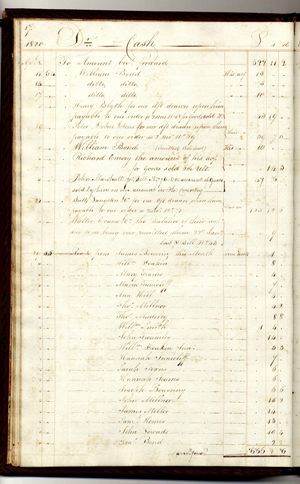
Archive sources
|
A thriving local industry: a weaving business’s accountsDetails of income and expenditure from a tape-weaving business in East Staffordshire, 1820. The hamlet of Morrey near Yoxall was the centre of a small but dominant cottage industry at this time, with a nearby bleaching works as well on the River Swarbourn, which soon after joins the important River Trent. At its peak in the first half of the nineteenth century, almost all the inhabitants were involved in some way or other. This can be confirmed from the occupations shown on the 1841 census, but the industry appears to have declined soon afterwards from the mid-nineteenth century. Members of the Bond family were closely involved throughout the period as investors and managers and at least one of them was also a weaver. These detailed accounts of income include monthly lists of workers who rented cottages or looms, and the names of businesses which had placed orders. The expenditure lists local suppliers for materials such as twine, fine flour, lime, and coals. Other payments were made for poor rates, Yoxall Society for the Prosecution of Felons, subscription to a Weavers' Feast, dying tape pink and black, carriage of tapes to London, Liverpool, Derby and Birmingham, expenses to go to Ashbourne Fair, and rent paid for houses and shops occupied by their workers, including Yoxall Mill weaving shop. Repairs to the looms or the making of new looms required carpentry work, and a lot of building was also happening as the business expanded and needed additional space.
|
